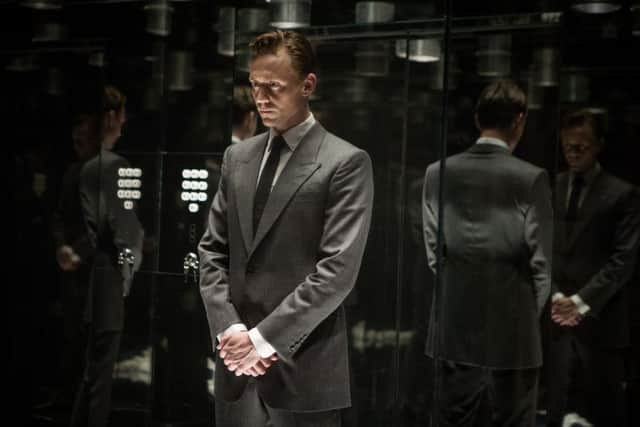Film review: High-Rise | Risen | Rock The Kasbah | Next To Her


When a book starts with the protagonist gnawing on the hindquarters of an Alsatian, the movie version can’t exactly downplay the twisted nature of the source material. In many ways that makes Kill List director Ben Wheatley the ideal candidate for bringing JG Ballard’s Thatcherism-anticipating dystopian nightmare High-Rise (***) to the big screen. Since his 2009 debut Down Terrace, Wheatley has established himself as Britain’s most interesting and versatile director, mixing up genres to present an alternate view of Britain in all its peculiarities. Similarly Ballard’s books don’t exactly lend themselves to easy categorisation. Beyond Steven Spielberg turning his semi-autobiographical novel Empire of the Sun into a sweeping historical epic, the only notable adaptation of Ballard’s work until now has been Crash, which required the transgressive talents of David Cronenberg to tackle the car-crash fetishism of the novel on the big screen. Wheatley shares Cronenberg’s penchant for extreme but intelligent horror and while High-Rise is unlikely to inspire the kind of tabloid notoriety Crash attracted, it does go all out in depicting the breakdown of the social order that Ballard described so chillingly in the book.
Set in a tower-block in which the residents’ social class determines what floor of the building they get to inhabit, the film stars Tom Hiddleston as a debonair and upwardly mobile doctor whose ability to shift between the different social strata becomes an inadvertent survival tool as civil war breaks out between the building’s bacchanalian upper echelons and its hungry-for-advancement lower orders. Though Ballard didn’t specify a time period in the book, Wheatley has chosen to date the film to 1975, the year the novel was published and the year Margaret Thatcher became leader of the Conservative Party. Her ideas about society hang heavy in the air and the film makes the most of the magnificent period production design – all brutalist architecture, gaudy wallpaper and despicable decadence – to intensify the chaos that ensues when this “crucible for change” – as the building’s architect (Jeremy Irons) describes it – becomes instead a cauldron of carnivorous carnage.
Advertisement
Hide AdWhether the film offers much more to chew on than the outrages signified by those aforementioned canine delicacies is another matter. Producer Jeremy Thomas – who also produced Crash – has been trying to get this made since the 1970s and there’s a sense that whatever satirical import it might once have had has curdled en route to landing in Wheatley’s lap. Except in an abstract way, it doesn’t feel especially relevant to what’s going on in the world today and while it’s stylishly done, and makes for macabre and delirious viewing at times, it’s also messy and confusing in ways that don’t always suggest Wheatley is in full control of the story. His career is still very much on the up, but this isn’t quite the grand breakthrough it perhaps should have been.
Still, better to be on the up than plummeting rapidly to the bottom. In career terms Hollywood director Kevin Reynolds took a big dive after Robin Hood: Prince of Thieves with Waterworld and never really recovered. His latest is a polished and good-looking biblical epic arriving just in time for Easter, but its title should really be changed from Risen (**) to Risible given the hokey story it tells. Joseph Fiennes takes the lead as Clavius, a Roman centurion charged with hunting down the missing body of a recently crucified Jewish preacher who goes by the name of Yeshua (Cliff Curtis) and who, rumour has it, can perform miracles. Structured as a sort of biblical detective movie – replete with mismatched partners (Tom Felton co-stars as Clavius’s younger cohort Lucius) – the film has a curiosity value to be sure, but it’s so earnest and heavy handed it’s hard to take seriously in the end and Clavius’s inevitable conversion from cynic to true believer comes off as bad supernatural fiction. No career resurrection to see here.
Career resurrection isn’t on the agenda for Barry Levinson either. With Rock the Kasbah (*), the Oscar-winning director behind Rain Man, Diner and Good Morning Vietnam displays a surprising lack of care with this shockingly dull Bill Murray film. To be fair, Murray isn’t aiding his own cause here. He’s been coasting on his curmudgeonly charm a bit too much of late and it’s not enough to enliven this tonally ill-judged comedy about a faded rock promoter (Murray) who winds up in Afghanistan where he attempts to shepherd a young Pashtun woman (Leem Lubany) through the Afghani version of X Factor. Random roadside explosions and the threat of beheadings are some of the awful plot devices used to jump start the meandering story, which pretty much amounts to the same old dated and somewhat offensive depiction of foreign lands as playgrounds for white westerners in search of redemption and a cause to bring meaning to their lives.
Much better is Next to Her (***), an absorbing and compassionate Israeli film about young woman (Liron Ben-Shlush) tending to the special needs of her younger sister (Dana Ivgy). Needless to say the subject matter makes this heavy going, but it’s a compassionate and moving study of family commitments and the need to sometimes let the outside world in. It also strikes no false notes – a consequence of writer/star Ben-Shlush basing it on her own family experiences and her director husband Asaf Korman handling the material with sensitivity, depth and an admirable lack of sentimentality.